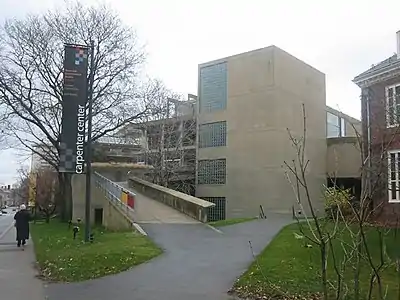Harvard Film Archive
The Harvard Film Archive (HFA) is a film archive and cinema located in the Carpenter Center for the Visual Arts at Harvard University in Cambridge, Massachusetts. Dedicated to the collection, preservation and exhibition of film, the HFA houses a collection of over 25,000 films in addition to videos, photos, posters and other film ephemera from around the world and from almost every period in film history. The HFA cinematheque screens films weekly in its 188-seat theater. It also maintains a film conservation center near Central Square, Cambridge. Harvard Film Archive won the 2020 Webby Award for Cultural Institution in the category Web.[1]

History
The archive was founded in 1979 by Robert Gardner, Vlada K. Petric and Stanley Cavell in Harvard's Department of Visual and Environmental Studies, with grants from the Henry Luce Foundation and the National Endowment for the Humanities. It opened on March 16, 1979 with a screening of Ernst Lubitsch’s silent film, Lady Windermere's Fan.
The archive's first curator was Vlada K. Petric , who expanded the collection and established the year-round regular screenings. He retired in 1995 and in 1999 Bruce Jenkins assumed the post.
In January 2005, Harvard Faculty of Arts and Sciences dean William C. Kirby announced that the archive would be absorbed by the Harvard College Library and managed by the Library of Fine Arts. This caused some concern within the Harvard community about the future of the archive and its programming. Jenkins resigned soon after the announcement.[2]
In September 2006 film scholar Haden Guest became the new director of the archive. He addressed worries that the archives' absorption in the Library would affect its public film screenings.[3]
Collection
The collection spans the history of film-making from the silent film era to today, and includes Hollywood films, documentaries, animation, short films, B-movies and feature films from all over the world. It is the largest collection of 35mm film in New England. The collection grows by an average of 15 to 20 films a year and contains some rarities, such as some of the only prints in the United States of several films by Serbian director Dusan Makavejev. It also features a large collection of German cinema and the Bavarian Film Fund donates prints of any films that it finances.[4] After the death of Karen Aqua, the archive was given more than 300 of her works, both completed and unfinished.[5]
Film conservation
The Archive's mission includes to conserve, restore, and exhibit the collection's prints. It prioritizes film-to-film preservation for archival stability, authenticity, and aesthetics.[6] It may also perform film-to-digital transfers.
References
- Kastrenakes, Jacob (20 May 2020). "Here are all the winners of the 2020 Webby Awards". The Verge. Retrieved 22 May 2020.
- "The Harvard Film Archive". Harvard Magazine. November–December 2005. pp. 37–38. Archived from the original on 2006-11-14.
- Brokaw, Leslie (November 12, 2006). "New director Guest plans larger role for Harvard Film Archive". The Boston Globe.
- "Film Archive Goes Silver". Harvard Magazine. January–February 2004. pp. 57–58. Archived from the original on 2006-11-14.
- Meek, Tom (2016-04-16). "Local Animator Karen Aqua Remembered In Retrospective At Harvard Film Archive". WBUR. Retrieved 2020-10-30.
- Austerlitz, Saul (2007-12-19). "Preserving history, frame by frame". Boston.com. Retrieved 2019-05-10.